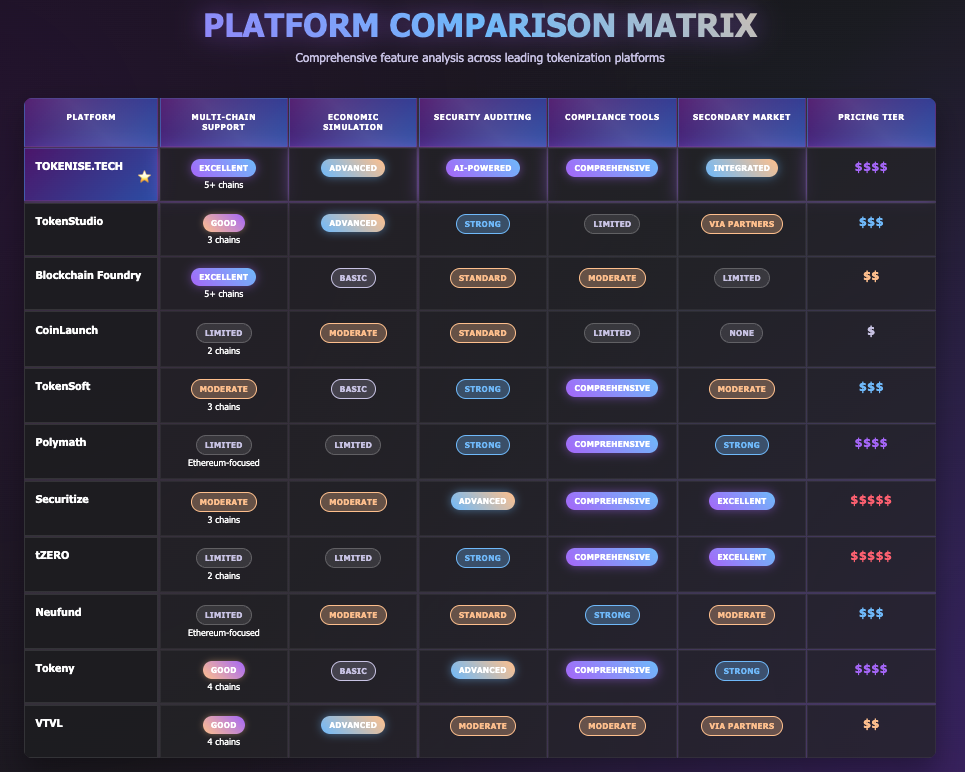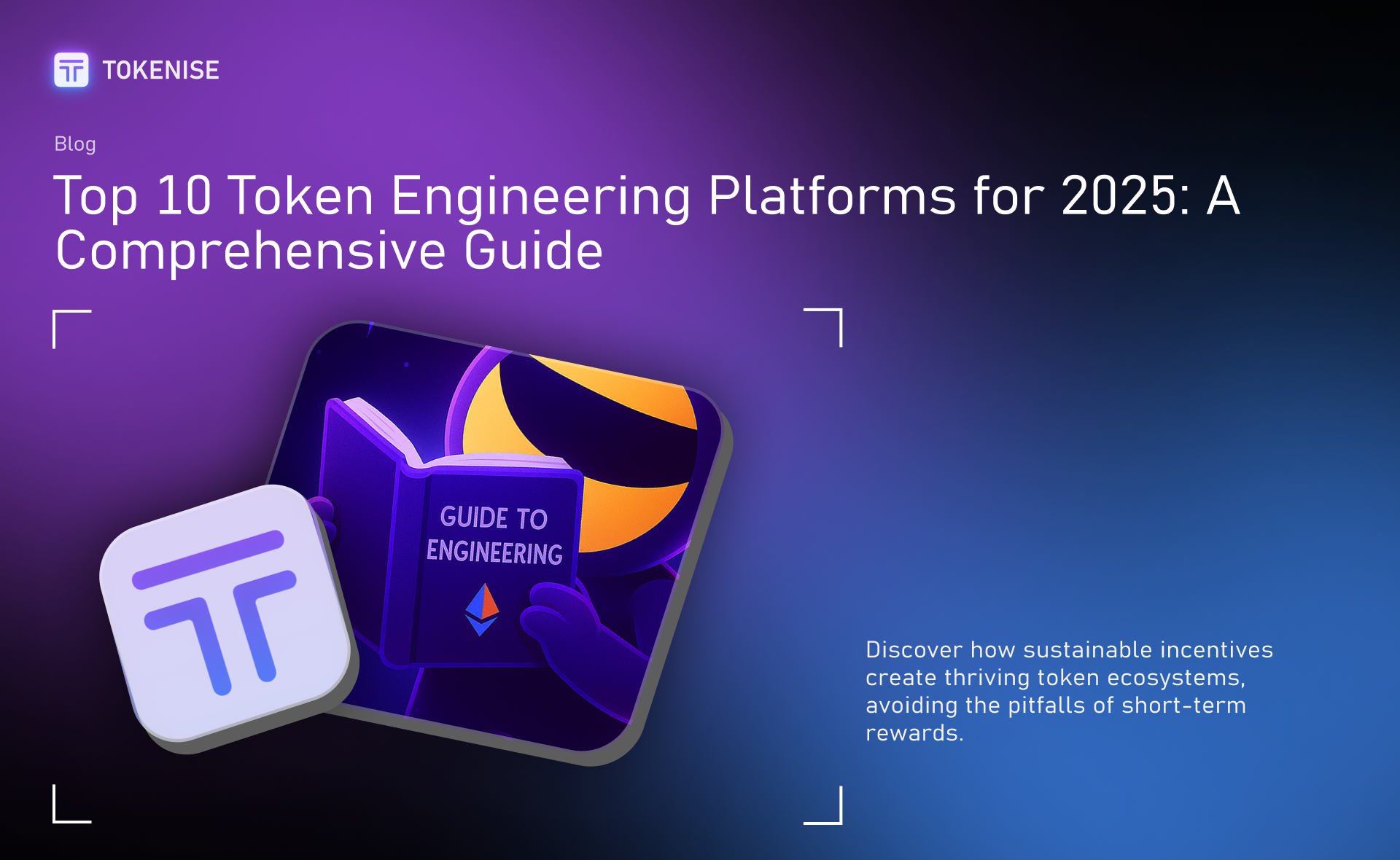The Evolution of Token Engineering: Why Platforms Matter
In the rapidly evolving world of blockchain and cryptocurrencies, token engineering has emerged as a critical discipline for project success.
As of 2025, the landscape of token creation and management is undergoing a significant transformation, driven by sophisticated platforms that streamline the process and mitigate risks.
"Token engineering is no longer a luxury—it's a necessity for any serious blockchain project," says Daniel Tauhore, CEO of Tokenise. "The right platform can be the difference between a token that thrives and one that fails to gain traction."
The Stakes Are High: Why Choose Wisely
Consider this: According to a 2023 report by Blockchain Capital, projects that utilized advanced token engineering platforms saw a 37% higher success rate in achieving their initial funding goals compared to those that didn't. This statistic underscores the critical role these platforms play in the lifecycle of a token project.
Understanding Token Engineering Platforms: Core Functionalities
At their core, token engineering platforms provide a suite of tools designed to simplify the complex process of creating, deploying, and managing tokens. But what exactly should you look for in a top-tier platform?
Key Features of Leading Platforms
Multi-Chain Support: The ability to deploy tokens across various blockchain networks, including Ethereum, Binance Smart Chain, Solana, and Polygon, maximizing reach and flexibility.
Smart Contract Templates: Pre-audited, customizable smart contract templates to ensure security and efficiency while reducing development time.
Token Economics Simulation: Tools to model and test token distribution and economic incentives under various market conditions and user behaviors.
Governance Mechanisms: Built-in features for implementing on-chain governance, enabling decentralized decision-making and community participation.
Security Auditing: Integrated security checks and audit tools to identify vulnerabilities before deployment, reducing exploits and protocol failures.
"The best platforms don't just offer tools; they offer a comprehensive ecosystem for token lifecycle management," notes a senior analyst at Messari Research.
Blockchain Network Considerations for Token Launches
When evaluating token engineering platforms, it's crucial to understand the underlying blockchain networks they support. Each network offers distinct advantages for different types of token projects:
- Ethereum: Still dominates for DeFi and NFT projects due to its robust security and widespread adoption, despite higher gas fees. The transition to Ethereum 2.0 has significantly improved scalability.
- Binance Smart Chain (BSC): Offers faster transaction speeds and lower costs, making it attractive for consumer-facing applications and startups with limited initial funding.
- Solana: Provides exceptional transaction throughput ideal for high-frequency trading tokens and applications requiring near-instant finality.
- Polygon: Positions itself as an Ethereum scaling solution with lower fees while maintaining EVM compatibility, popular for GameFi tokens and Web3 applications.
- Polkadot: Enables specialized, interoperable blockchains through its parachain architecture, beneficial for projects requiring custom blockchain logic while maintaining cross-chain communication.
The best token engineering platforms in 2025 offer seamless deployment across multiple networks, allowing projects to leverage the unique strengths of each blockchain ecosystem without requiring specialized development skills.
Methodology: How We Evaluated the Top 10
To compile our list of the top 10 token engineering platforms for 2025, we employed a rigorous methodology based on several key factors:
1. Feature Set: Comprehensiveness and innovation of tools offered, with particular attention to tokenomics simulation capabilities.
2. User Experience: Ease of use and learning curve for both technical and non-technical team members.
3. Security: Robustness of security features and audit history, including vulnerability detection rates.
4. Community and Support: Strength of developer community and quality of customer support, measured through response times and resource availability.
5. Integration Capabilities: Ability to integrate with other tools and services in the broader blockchain ecosystem.
6. Pricing and Accessibility: Cost-effectiveness and availability of free trials or tiered pricing models.
7. Regulatory Compliance Tools: Capabilities for addressing KYC/AML requirements and securities regulations.
8. Secondary Market Support: Features facilitating token liquidity and trading after initial issuance.
Data was collected from multiple sources, including user reviews on G2 and Capterra, technical documentation, and interviews with platform users and industry experts.
The Top 10 Token Engineering Platforms for 2025
Traditional and DeFi-Focused Platforms
- Tokenise.tech
- TokenStudio
- Blockchain Foundry
- CoinLaunch
- TokenSoft
- Polymath
- Securitize
- Neufund
- Tokeny
- VTVL
Institutional-Grade Tokenization Platforms
As the token engineering space matures, a new category of institutional-focused platforms has emerged, catering specifically to enterprise-level deployments and regulated asset tokenization:
1. Superstate: Specializing in blockchain-native investment products for traditional finance institutions, featuring compliant token structures that mirror conventional financial instruments while leveraging blockchain efficiency.
2. Centrifuge: Focused on real-world asset (RWA) tokenization across multiple blockchains, enabling businesses to tokenize invoices, real estate, and other traditional assets with comprehensive compliance tooling.
3. Circle USYC: Pioneering yield-bearing compliant tokens designed specifically for institutional investors, with built-in regulatory reporting and seamless integration with traditional banking systems.
These institutional platforms represent the growing convergence between traditional finance and blockchain technology, offering enterprise-grade security, regulatory compliance, and the scalability required for large-scale tokenization initiatives.
Deep Dive: Tokenise.tech
Tokenise.tech stands out in our analysis for its comprehensive suite of tools and user-friendly interface. Key features include:
- Multi-chain deployment support for Ethereum, Binance Smart Chain, and Polygon
- Advanced token economics simulation tools with Monte Carlo analysis capabilities
- Regulatory compliance tooling for multiple jurisdictions
A case study of DeFi protocol LaunchPad, which used Tokenise.tech for its token launch, reported a 40% reduction in development time and a successful raise of $15 million in its initial offering.
"Tokenise.tech's simulation tools were invaluable in fine-tuning our tokenomics," says the CTO of Alias. "We were able to test multiple scenarios and optimize our distribution strategy before going live."
Comparative Analysis: How the Platforms Stack Up
When comparing these platforms, several key differentiators emerge:
- Network Support: While all platforms support Ethereum, only 60% offer multi-chain deployment.
- Smart Contract Customization: 80% offer customizable templates, but the degree of flexibility varies.
- Simulation Tools: Only 50% provide advanced economic simulation capabilities.
- Governance Features: 70% include basic governance tools, but only 30% offer advanced, customizable solutions.
- Security Auditing: All platforms offer some level of security checks, but only 40% provide comprehensive, AI-powered auditing.

This matrix highlights the specialization trends in the token engineering platform market.
While some platforms like Tokenise.tech offer broad functionality across multiple categories, others like Polymath and Securitize have focused on creating exceptional compliance and security token capabilities, particularly valuable for regulated assets and security token offerings.
Choosing the Right Platform: Factors to Consider
Selecting the ideal token engineering platform depends on your specific project needs. Consider the following:
Project Scale: Larger projects may require more advanced features and customization options.
- Enterprise-level initiatives should prioritize platforms with robust security, compliance, and scalability
- Startups might prioritize cost-efficiency and ease of use
Technical Expertise: Some platforms cater to developers, while others are more accessible to non-technical users.
- Developer-centric teams can leverage platforms with extensive customization
- Business-focused teams might prefer no-code/low-code solutions
Budget: Pricing models vary significantly, from free tiers to enterprise-level subscriptions.
- Most platforms offer tiered pricing based on features and transaction volume
- Consider long-term costs as your project scales
Regulatory Compliance: If you're launching a security token, look for platforms with built-in compliance features.
- Security tokens require platforms with comprehensive KYC/AML integration
- Utility tokens have more flexibility but still benefit from compliance tools
Blockchain Network Selection: Consider which blockchain networks your target audience uses most.
- Ethereum remains dominant for DeFi and NFTs despite higher gas fees
- BSC and Polygon offer cost advantages for consumer applications
- Specialized use cases may benefit from purpose-built chains like Solana (for high throughput) or Polkadot (for customization)
"Don't just focus on features," advises a Daniel Tauhore, engineering consultant. "Consider the long-term support and ecosystem around the platform. You're not just choosing a tool; you're choosing a partner in your project's journey."
Future Trends: What's Next for Token Engineering Platforms
As we look towards 2025 and beyond, several trends are likely to shape the evolution of token engineering platforms:
Increased AI Integration: Expect more platforms to incorporate AI for security auditing and tokenomics optimization.
Advanced platforms now use machine learning to:
- Identify potential economic vulnerabilities in token designs
- Automatically suggest token distribution improvements based on project goals
- Detect unconventional attack vectors in smart contract code
- Predict market responses to specific token incentive structures
Cross-Chain Interoperability: Platforms will likely focus on seamless deployment across multiple blockchains.
Leading platforms now offer:
- Cross-chain bridges built directly into deployment tools
- Unified management interfaces for tokens deployed on multiple networks
- Standardized approaches to cross-chain governance
- Support for emerging interoperability protocols like Polkadot's XCMP and Cosmos IBC
Regulatory Adaptation: As regulations evolve, platforms will need to stay agile in their compliance offerings.
- Integration with decentralized identity solutions for permissioned token access
- Automated compliance checks across multiple jurisdictions
- Built-in reporting tools for regulatory requirements
Decentralized Governance Tools: More sophisticated on-chain governance mechanisms will become standard.
- Quadratic voting and other advanced voting mechanisms
- Multi-signature governance with customizable permission structures
- Reputation-based systems to prevent governance attacks
Institutional Integration: Enterprise and institutional adoption will drive features catering to large organizations.
- Private deployment options with enterprise-grade security
- Integration with traditional financial infrastructure
- Advanced reporting and analytics for institutional requirements
Empowering the Next Generation of Token Projects
The landscape of token engineering platforms is rich and diverse, offering solutions for projects of all sizes and complexities. As we've seen, choosing the right platform can significantly impact a project's chances of success.
Tokenise.tech stands out for its comprehensive feature set, user-friendly interface, and robust security measures. However, the best choice will always depend on your specific project needs and goals.
As you embark on your token engineering journey, remember that the platform you choose is more than just a tool—it's a foundation for your project's future. Take the time to evaluate your options carefully, and don't hesitate to leverage free trials and demos to ensure the best fit.
The future of blockchain is being built today, one token at a time. With the right platform, you're well-equipped to be part of that future.
Ready to build sustainable tokenomics? Visit Tokenise.tech to access professional-grade token engineering tools and launch your token.
Disclaimer: This analysis is based on public information and should not be considered financial advice. Always conduct your own research before making any investment decisions.
Sources
- Amina Group: Top 10 Tokenization Platforms of 2025
- Shamlatech: Popular Platforms to Launch a Crypto Token
- CoinsClone: Top 10 Blockchain Platforms
- Hela Labs: Top 12 Asset Tokenization Platforms
- Blockchain Capital 2023 Report
- Messari Research: Token Platform Analysis
